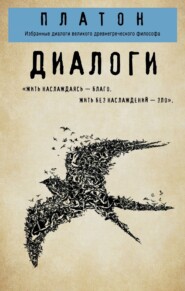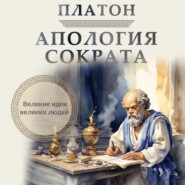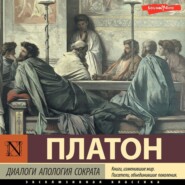По всем вопросам обращайтесь на: info@litportal.ru
(©) 2003-2025.
✖
The Republic
Настройки чтения
Размер шрифта
Высота строк
Поля
Undoubtedly.
Then we have found the desired natures; and now that we have found them, how are they to be reared and educated? Is not this an enquiry which may be expected to throw light on the greater enquiry which is our final end – How do justice and injustice grow up in States? for we do not want either to omit what is to the point or to draw out the argument to an inconvenient length.
Adeimantus thought that the enquiry would be of great service to us.
Then, I said, my dear friend, the task must not be given up, even if somewhat long.
Certainly not.
Come then, and let us pass a leisure hour in story-telling, and our story shall be the education of our heroes.
By all means.
And what shall be their education? Can we find a better than the traditional sort? – and this has two divisions, gymnastic for the body, and music for the soul.
True.
Shall we begin education with music, and go on to gymnastic afterwards?
By all means.
And when you speak of music, do you include literature or not?
I do.
And literature may be either true or false?
Yes.
And the young should be trained in both kinds, and we begin with the false?
I do not understand your meaning, he said.
You know, I said, that we begin by telling children stories which, though not wholly destitute of truth, are in the main fictitious; and these stories are told them when they are not of an age to learn gymnastics.
Very true.
That was my meaning when I said that we must teach music before gymnastics.
Quite right, he said.
You know also that the beginning is the most important part of any work, especially in the case of a young and tender thing; for that is the time at which the character is being formed and the desired impression is more readily taken.
Quite true.
And shall we just carelessly allow children to hear any casual tales which may be devised by casual persons, and to receive into their minds ideas for the most part the very opposite of those which we should wish them to have when they are grown up?
We cannot.
Then the first thing will be to establish a censorship of the writers of fiction, and let the censors receive any tale of fiction which is good, and reject the bad; and we will desire mothers and nurses to tell their children the authorised ones only. Let them fashion the mind with such tales, even more fondly than they mould the body with their hands; but most of those which are now in use must be discarded.
Of what tales are you speaking? he said.
You may find a model of the lesser in the greater, I said; for they are necessarily of the same type, and there is the same spirit in both of them.
Very likely, he replied; but I do not as yet know what you would term the greater.
Those, I said, which are narrated by Homer and Hesiod, and the rest of the poets, who have ever been the great story-tellers of mankind.
But which stories do you mean, he said; and what fault do you find with them?
A fault which is most serious, I said; the fault of telling a lie, and, what is more, a bad lie.
But when is this fault committed?
Whenever an erroneous representation is made of the nature of gods and heroes, – as when a painter paints a portrait not having the shadow of a likeness to the original.
Yes, he said, that sort of thing is certainly very blameable; but what are the stories which you mean?
First of all, I said, there was that greatest of all lies in high places, which the poet told about Uranus, and which was a bad lie too, – I mean what Hesiod says that Uranus did, and how Cronus retaliated on him. The doings of Cronus, and the sufferings which in turn his son inflicted upon him, even if they were true, ought certainly not to be lightly told to young and thoughtless persons; if possible, they had better be buried in silence. But if there is an absolute necessity for their mention, a chosen few might hear them in a mystery, and they should sacrifice not a common (Eleusinian) pig, but some huge and unprocurable victim; and then the number of the hearers will be very few indeed.
Why, yes, said he, those stories are extremely objectionable.
Yes, Adeimantus, they are stories not to be repeated in our State; the young man should not be told that in committing the worst of crimes he is far from doing anything outrageous; and that even if he chastises his father when he does wrong, in whatever manner, he will only be following the example of the first and greatest among the gods.
I entirely agree with you, he said; in my opinion those stories are quite unfit to be repeated.
Neither, if we mean our future guardians to regard the habit of quarrelling among themselves as of all things the basest, should any word be said to them of the wars in heaven, and of the plots and fightings of the gods against one another, for they are not true. No, we shall never mention the battles of the giants, or let them be embroidered on garments; and we shall be silent about the innumerable other quarrels of gods and heroes with their friends and relatives. If they would only believe us we would tell them that quarrelling is unholy, and that never up to this time has there been any quarrel between citizens; this is what old men and old women should begin by telling children; and when they grow up, the poets also should be told to compose for them in a similar spirit. But the narrative of Hephaestus binding Here his mother, or how on another occasion Zeus sent him flying for taking her part when she was being beaten, and all the battles of the gods in Homer – these tales must not be admitted into our State, whether they are supposed to have an allegorical meaning or not. For a young person cannot judge what is allegorical and what is literal; anything that he receives into his mind at that age is likely to become indelible and unalterable; and therefore it is most important that the tales which the young first hear should be models of virtuous thoughts.
There you are right, he replied; but if any one asks where are such models to be found and of what tales are you speaking – how shall we answer him?
I said to him, You and I, Adeimantus, at this moment are not poets, but founders of a State: now the founders of a State ought to know the general forms in which poets should cast their tales, and the limits which must be observed by them, but to make the tales is not their business.
Very true, he said; but what are these forms of theology which you mean?
Something of this kind, I replied: – God is always to be represented as he truly is, whatever be the sort of poetry, epic, lyric or tragic, in which the representation is given.
Right.
And is he not truly good? and must he not be represented as such?
Certainly.
And no good thing is hurtful?
No, indeed.
And that which is not hurtful hurts not?

















